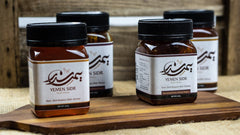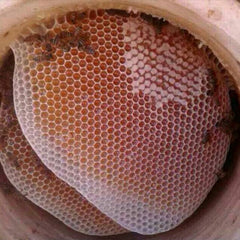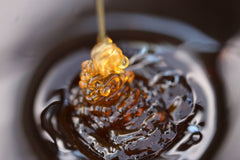It is believed that they can heal wounds and cure illnesses! Two of the most globally known types of honey, Sidr honey and Manuka honey, are full of unique characteristics and medicinal properties that differentiate them from the rest of the raw honey. So, what puts them in such a high place? Are they the same? Of course, Sidr honey and Manuka honey have their own stories. To clarify, we will tell these stories in the following lines supported with strong references from academic studies and laboratory experiments.
The geographical background
The Sidr honey is produced from the Sidr tree, called Ziziphus Spina – Christi, Lote tree, Christ’s Thorn, Jujube, or Nabkh tree. The Sidr tree also has religious importance, as mentioned in the Quran as a tree from heaven. While in the Bible, the crown of Jesus is believed to be made from Sidr branches. Besides the religious significance, the Sidr tree by itself is used locally in healing wounds, relieving stomachache, curing skin problems, and other health usages. The most popular and unique Sidr honey is produced in Yemen, Oman and South Saudi.

On the other hand, Manuka honey is produced from the nectar of the tea tree called Leptospermum Scoparium, and such a tree can be found in Australia and New Zealand. Still, Manuka honey from New Zealand is the most popular one. In terms of the medicinal properties of Leptospermum Scoparium, the local people, Maori, used oil for its antiseptic and antibacterial properties.

Characteristics
When we say “honey”, we have that idea of sweet substance, but Manuka is kind of excluded from that idea. Manuka honey is brown honey with a slightly bitter taste, and it is more solid than the local types of honey. In comparison, Sidr honey is thick with a rich, lavish and buttery sweet taste. Sidr honey also has a golden color that becomes dark and reddish over time.
Medicinal Properties
As mentioned, the Sidr tree and Leptospermum Scoparium plant are used to help in treating several illnesses, and the honey produced from them have equally unique medicinal properties. Both Sidr honey and Manuka honey, for example, are known as effective antioxidants, antibacterials, and anti-inflammations.
Antibacterial Properties of Both Sidr and Manuka
Antibiotics are the medicine for bacterial infections that hit both humans and animals; the problem here is that bacteria always develop their defending methods towards chemical medicine until we have antibiotic-resistance bacteria. That kind of bacteria makes it harder and more costly to treat infections such as; pneumonia, tuberculosis, gonorrhoea, and salmonellosis.
Researchers from the University of Ottawa tested Sidr and Manuka honey’s antibacterial activities. Why honey? Because it is believed that honey is an antibiotic with no side effects in the long run.
They compared the impact of the commonly used chemical antibacterial medicines and both Yemeni Sidr honey and Manuka honey on single bacteria and biofilms. The two types of honey showed 100% effectiveness in killing MSSA, MRSA, and PA single bacteria. In contrast, the effectiveness had changed in the case of bacteria grown under a slimy layer that shows more resistance to antibiotics called biofilms.
Look at the following table to know more:

Dr Susan Richardson, head of microbiology at the Hospital for Sick Children in Toronto, said that you don’t need to inject the honey into the blood veins or swallow it; you just apply it onto the surface of the bacteria, and it will work!
Antioxidant and Anti-inflammatory Properties
Antioxidants are substances that can prevent or slow damage to cells caused by free radicals. They are unstable molecules the body produces as a reaction to environmental and other pressures. It is known that certain plant-based foods are thought to be rich in antioxidants as well as anti-inflammations.
Sidr Honey
A study published in 2013 from King Saud University investigates the possible protective effect of Sidr honey on carbon tetrachloride-induced oxidative stress and liver and kidney damage in rats. The researchers gave the Sidr honey to the rats orally and started observing the results on the animals’ liver and kidneys.
The study concluded that Sidr honey showed effective protection to the liver and kidneys from damage. Moreover, it showed strong antioxidant activity in DPPH and ß-carotene-linoleic acid assays. Honey also contained phenolic compounds that may be a potential treatment for cardiovascular diseases.
In another study published in the World Academy of Science, Engineering and Technology magazine, 2011, researchers studied the anti-inflammatory properties of Yemeni Sidr honey on rats. The application of Yemeni Sidr honey on rats showed great potential in inhibiting both phases of carrageenan-induced paw oedema compared with the chemical medicines. Based on the results, it can be suggested that Yemeni Sidr honey’s ability to inhibit carrageenan-induced paw oedema may be due to its suppression of the release of mediators responsible for inflammation, including histamine, serotonin, bradykinin and prostaglandin.
Manuka Honey
Discovering the Antioxidant and Anti-inflammatory properties of Manuka honey is the aim of a study published in 2017. The researchers studied the impact of the three different concentrations of Manuka honey on groups of rats to indicate whether there is a positive impact or not. They came to the conclusion that manuka honey is effective in treating chronic ulcers and preserving mucosal glycoproteins. That’s because it has antioxidant and anti-inflammatory properties. The effects are due to a significant reduction of gastric mucosal MDA, TNF-α , IL-1β, IL-6 and caused an elevation in IL-10 levels.
In simple words, Sidr honey and Manuka honey showed potential effectiveness in healing wounds and curing several illnesses such as relieving sore throat, cough, gut problems, and flu. Also, both of them have some evidence in boosting immunity, energy levels, and memory retention. While they help with hangovers, they can also aid in resting better and reduce bed-wetting for kids. Needless to say that most, more than %95, of the medical uses of Sidr and Manuka honey are being done under certain procedures and special circumstances.
Proper Consumption

- Take one spoonful before going to bed to get rid of any parasites or bacteria that may be in your stomach.
- In case you have a stuffy nose, take one spoon of Sidr honey with some water to clear it out.
- Drink one teaspoonful of Sidr honey every day to cure diarrhea or other stomach problems.
- Mix one spoonful of the honey with milk and drink it before going to sleep at night to help treat insomnia
- Add one teaspoonful of Sidr honey to a glass of water used for gargling to relieve sore throats and mouth sores.
- Take one teaspoonful with water every day to lower blood sugar levels in diabetics or those who are prone to diabetes.
The story of Yemeni Sidr Honey

Yemen suffers from armed conflict, and the apocalyptic scenes dominate the whole country. Accordingly, Yemeni people lost nearly everything due to that war, which they had nothing to do with. Moreover, all they got from this war were losses, as they lost their homes, work, families, and most of them lost their lives; still, Yemenis didn’t lose hope. What gives them hope right now is working on the Yemeni Sidr honey industry, which helps the local beekeepers and their families look into a brighter future for themselves by doing what they love and reviving the country’s legacy that was once known as the Arabia Felix! That’s a whole other level of motivation to produce raw honey of the highest quality ever.
Side Effects
The Side effects only occur when you take more than the recommended dosage, and it does not happen when you are taking the correct amount. The most common side effect is stomach upset, but this condition is very rare. The only problem you have to watch out for is the allergic reaction that some people have to the honey, usually manifested in the form of a rash. Also, kids under 12 are not advised to use raw honey, and diabetic people should ask their doctors before using honey.
Conclusion
Sidr honey and Manuka honey have several medicinal properties supported by laboratory experiments from reputable organizations, which gives them the advantage over the other types of honey. Still, there is a misconception that they are similar to each other, but they are not, as the Yemeni Sidr honey has much unique and smoother taste, along with its substantial positive impact on the whole country of Yemen and its people.
Resources:
- https://www.hindawi.com/journals/ecam/2013/569037
- https://www.webmd.com/cold-and-flu/news/20080922/humble-honey-kills-bacteria
- https://pubmed.ncbi.nlm.nih.gov/28250794/
- https://pubmed.ncbi.nlm.nih.gov/18688794/
- http://healthywithhoney.com/wp-content/uploads/2015/01/Investigation-of-Anti-Inflammatory-Antipyretic-and-Analgesic-Effect-of-Yemeni-Sidr-Honey.pdf
- https://researchcommons.waikato.ac.nz/bitstream/handle/10289/5696/thesis.pdf?sequence=3
- https://onlinelibrary.wiley.com/doi/10.1002/jsfa.1952
- https://www.hindawi.com/journals/ijbm/2019/6132581/
- sidrhoney.tripod.com/id12.html;
- www.hindawi.com/journals/ecam/2013/569037/;
- www.islamicbookstore.com/a6060.html



